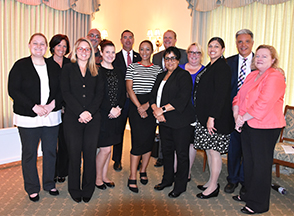By Beth David, Editor
Ever find yourself face to face with a customer who just does not seem to get it, who just does not seem to understand what you are saying? Your instinct tells you that something’s wrong, but you can’t figure out what. Should you get angry, get firm, or maybe consider that the person has a dementia problem, and be gentle?
That is the focus of “Dementia Friendly @ Work,” a program offered by Community Nurse Home Care to local businesses. The agency is hoping to get local businesses to understand how best to approach people who may have some dementia, but not enough that they are constantly with a caregiver. Sometimes, it’s a matter of people being able to function, but getting confused in new situations.
As the Baby Boomers age, it is estimated that this area will have 30,000 people with Alzheimer’s Disease, Tanisha Washington told staff members at Waring-Sullivan funeral home in Fairhaven on Friday, 8/17. And the millennials outnumber the Baby Boomers, she noted.
The workshop identifies 10 early signs of dementia, with examples, and also gives some tips on how to communicate with someone who may be having memory problems.
Signs include memory loss that disrupts daily life, such as a good customer walking out without paying; a customer calling for three days in a row to refill a prescription that was already filled; employees making errors at work and saying the system has changed; drivers believing the street names have changed because they keep getting lost; a customer enters your store and then forgets where he or she is or how he got there; a person cannot find the words to order a product he or she has ordered regularly in your store; a customer sets down her purse and accuses a worker of stealing it; someone who has always been easy-going is angry every time he goes into your store.

Staff members of Waring Sullivan funeral home on Washington Street in Fairhaven pose for a picture with Tanisha Washington (center, front), after they participated in the “Dementia Friendly @ Work” program on 8/17/18. Photo by Beth David.
The program offers practical advice on how to communicate with people who may be showing signs of dementia.
First, approach then from the front, so as not to startle them. They may have loss of peripheral vision.
Speak clearly and calmly, they might need a little extra time to understand the words they are hearing. Don’t rush them
Smile and make eye contact. People with dementia may have trouble understanding words, but they may quickly interpret body language and tone.
As caring for people at home becomes more prevalent, people with dementia will be out in the community more, said Ms. Washington.
“Aging at home is going to be the big push,” she said.
And although older people do not want to leave the house anyway, it is not healthy for them, or their caregivers. So it is important for them to feel safe in the community.
The program offers suggestions for a dementia friendly space, such as good lighting to avoid shadows, which can appear as holes to people with vision issues. Small changes can make a big difference.
Good signage makes it easier for people to stay oriented and not get lost; plain colors, instead of bold patterns on floors or curtains are easier to navigate; quiet areas for someone who may be feeling anxious, and family restrooms so a caregiver can accompany a person, are also suggestions.
The workshop offers a chance for employees to ask questions, and give their own examples.
At Waring-Sullivan, staff members noted that they often have elderly visitors or family members of the deceased, and have learned to be patient and gentle dealing with them. In their case, though, a family member knows and will usually tell the funeral director or other staff member to expect someone with dementia.
Curt Moraes, a Funeral Director at Waring-Sullivan, said the organization is sensitive to the issue of Alzheimer’s and dementia, and as a funeral home, they service an aging population.
“I want us to understand how to speak to them and help them in their time of need,” said Mr. Moraes, including how to approach, and how to talk. “Just being gentle and caring and allowing people private space when needed.”
Funeral Director Jeff Davis said the point was to help the staff to recognize the signs in their customers.
“Because we do deal with elderly, grieving family members,” said Mr. Davis, adding that they see dementia in family members often.
“And they do participate” in the decision making, he said, so it is important to know how to communicate effectively with them. “We already see it.”
To learn more about the program, or to schedule a workshop at your workplace, contact Tanisha Washington at 508-717-0714.
•••
Support local journalism, donate to the Neighb News at: https://www.paypal.com/cgi-bin/webscr?cmd=_s-xclick&hosted_button_id=Y6V5ARRYH689G
Click here to download the entire 8/23/18 issue: 08-23-18 BenoitMusicNight



